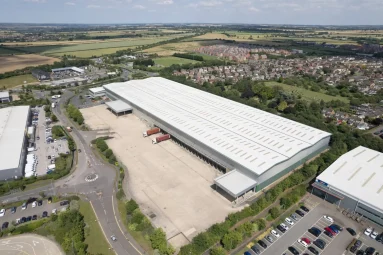
Top 10 Technology Trends Transforming Logistics
Technology continues to transform traditional logistics processes, driving supply chain leaders to adapt. What do these technologies look like and how could you be impacted?
Technology is enabling stronger customer engagement in large and small companies, and logistics is a key focus area for implementing these technologies. Connectivity and the widespread uptake of social media are increasing customer expectations, placing ever greater focus on the strength of a company’s logistics operations to meet, if not exceed, consumer demands.
From self-driving delivery vehicles and warehouse robots to time – and cost – saving data insights, here are the 10 technology trends that are transforming logistics and its management.
1. Cloud logistics
With half of logistics providers already using cloud-based services and another fifth about to, the future lies in remote-hosted data and process.
According to a study by Logistik Heute, 70% of companies say they will use cloud computing in the near future
Offering flexibility and real-time access to critical intelligence and operations software, cloud services are enabling the scaling of highly responsive on demand and pay-per-use business models that are becoming the norm in logistics.
Data migration and security may pose setup headaches and heavy data traffic can slow processing times, but the savings in costs and time achieved are making cloud logistics an increasingly attractive proposition.
2. Internet of Things
The connectivity of the Internet of Things (IoT) is more than just a cost cutter: it can boost operational efficiency, optimise usage, and strengthen operational security.
Deloitte reports the global smart sensor market is growing at a 19% annual rate and is expected to reach $60 billion by 2022
The constant flow of data between devices and logistics providers means supply chains can be self-monitoring and self-maintaining. In warehouse environments, smart sensors will alert robots to replenishment needs or pick and pack orders, while onboard telematics will optimise delivery routes in autonomous vehicles, transforming the way we staff and run our logistics operations now and in the near future.
3. Blockchain
Decentralised ledger technology has the potential to revolutionise the logistics industry. By removing multiple layers of complexity through secure, transparent transactional links, blockchains can take the paperwork out of bills, reduce delays, cut fraud, and slash costs across supply chains.
For now, blockchain technology must surmount the hurdles of association with questionable cryptocurrencies and prove its scalability. But look to the future, and the safe interconnectivity offered by blockchain could drastically increase payment speeds and bring a greater degree of transparency to an industry that can be frustrating in its bureaucratic complexity.
4. Artificial intelligence
“The future will be characterized by smart devices delivering increasingly insightful digital services everywhere,” David Cearley, Gartner Distinguished Vice President Analyst, reports. ‘We call this the intelligent digital mesh.’
From augmenting human skills (for instance, in the warehouse) and handling back-office tasks (such as accounting and human resources), can streamline logistics processes to incredible degrees of efficiency.
Fed with data culled from IoT systems, AI-led automation can be used as a predictive tool in such processes as warehousing, where it can identify upcoming fluctuations in demand to prevent shortages or overstocking. It can drive mechanical processes through robotic systems and computer vision, and can even smooth customer experiences through assistive bots. Demand analysis by AI can also weaponise marketing and retail strategies.
5. Virtual reality and digital twins
According to MNM, the digital twin market is set to be worth $15.66 billion by 2023. In the logistics space, the simulation and digital twinning of physical assets are becoming more commonplace as companies virtually test, monitor, and control machinery and processes.
According to MNM, the digital twin market is set to be worth $15.66 billion by 2023
Virtual reality (VR) is recreating realistic digital settings that enable immersive e-learning and the training of hazardous processes through safe replication of potentially dangerous environments. It is allowing planned operational procedures and proposed construction layouts to be tested through digital visualisation, providing opportunities to streamline blueprints and reduce flaws and costs. Managers also have the means through VR to test, operate and maintain physical assets through their digital twinning from data gathered by IoT systems.
6. Self-driving vehicles
According to Business Insider, last-mile delivery currently accounts for 53% of all transportation costs. From long-haul journeys to last-mile deliveries, driverless lorries and vans will almost certainly begin making an impact in the next few years as more than 40 companies continue extensive testing of the technology.
Long journeys require a high turnover of drivers and leave a huge carbon footprint. Autonomous tech can be utilised to part drive vehicles and guide them, supporting drivers practically and physiologically on demanding long runs. And it isn’t just for trucks: forklifts, pallet stackers, and other warehouse and worksite machinery will also become at least semi-autonomous.
According to Business Insider, last-mile delivery currently accounts for 53% of all transportation cost
The logistics industry will need to adapt to the new processes of constructing the vehicles too, adjusting auto parts supply chains and linking into the data feeds that will shape them.
7. Robotics and automation
Inbound Logistics reports that four-fifths of the world’s warehouses are run manually, offering huge potential for automation in logistics processes.
Robots have begun working collaboratively with humans, reducing repetitive work and providing vital labour at times of worker shortages. Future robotics will only get more sophisticated, with picking, packing, and sorting becoming more commonplace and last-mile deliveries either being carried out autonomously or assistively.
Approximately four-fifths of the world’s warehouses are run manually
Trailer-loading bots will relieve humans of this physically demanding task and utilise AI to load vehicles in the most optimal way.
8. Big data analytics
The flood of data generated by supply chains is providing the raw material that can be used to make structural changes and improvements across networks.
Analysis of this stream of intelligence can provide insights that will not only optimise processes such as capacity usage but also help forecast and reduce the costs of risks and point to new ways of monetising individual parts of a supply chain.
These insights can also be predictive, enabling anticipatory inventory adjustments to prevent incurring warehousing costs and also to bring goods closer to the markets that need them, when they need them.
9. Augmented reality
According to ABI Research, ‘the shipments of smart glasses for logistics are expected to generate revenue of $52.9 million in 2017, and will grow to $4.4 billion in 2022.’
Through heads-up visors or other digital devices such as smart glasses, warehousing tools can be augmented with barcode readers and other aids to hands-free operations. When linked into management systems, AR can help streamline operations and boost productivity.
The shipments of smart glasses for logistics are expected to generate revenue of $52.9 million in 2017, and will grow to $4.4 billion in 2022
Driving would become safer with navigation and assistive devices, last-mile deliveries will benefit from the deployment of object recognition software for completeness checks, and vehicle loading can be made more efficient through space optimisation prompts.
10. 3D printing
Local and regional supply chains could be redrawn and become more complex, or even eliminated, as 3D printing reduces the need for long-distance physical transportation of goods and parts.
But it is likely that logistics operators will be central to the development of the sector, which the McKinsey Global Institute expects to be worth $550 billion by 2025. In the growing aftermarket sector, logistics operators will be crucial to fulfilling spare parts and warehousing needs, and can even set up global 3D printing plants for on demand orders. They can also offer postponement services through local distribution centres.
The same technology that is driving up customer expectations is creating new opportunities for businesses to optimise their logistics operations in innovative and profitable ways. As more and more players switch on to the benefits of new and emerging technology for their logistics operations, it is the supply chain leaders unwilling to update their processes who will find themselves outcompeted and outdated. How could technology augment your logistics?
Unipart Logistics is currently working with a wide range of companies in the UK and abroad to provide support in many of these areas. For more information on how Unipart Logistics can assist your organisation, contact Katy Farrington.
More in Manufacturing

Intertronics: Driving Innovation in Adhesives and Assembly Solutions
For over four decades, Intertronics has been at the forefront of providing high-performance adhesives, coatings, sealants, and application equipment to industries that demand precision and reliability. From electronics and medical devices to automotive and aerospace, Intertronics’ expertise ensures that manufacturers can optimise their bonding and assembly processes with cutting-edge solutions.

Unipart named CCS supplier
Unipart has been named as a supplier on Crown Commercial Service’s (CCS) Logistics, Warehousing and Supply Chain Solutions (RM6329) framework agreement.

Owen Mumford: 70 Years of Innovation in Healthcare
Owen Mumford has been at the forefront of medical device innovation for over 70 years, pioneering solutions that enhance patient care and improve healthcare outcomes worldwide. Established in 1952 by Ivan Owen and John Mumford, the company has grown into a global leader in medical device design and manufacturing, with a commitment to quality, sustainability, and patient-centred innovation.
From this author

Unipart announces record performance for year ending 31 December 2024
Strong year of growth & expansion, celebrating 50 years of the Unipart brand

Unipart named CCS supplier
Unipart has been named as a supplier on Crown Commercial Service’s (CCS) Logistics, Warehousing and Supply Chain Solutions (RM6329) framework agreement.

Unipart partners GBUK
Unipart has formed a strategic partnership with GBUK

